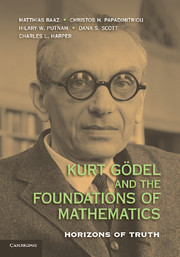Book contents
- Frontmatter
- Contents
- Contributors
- Foreword
- Preface
- Acknowledgments
- Short Biography of Kurt Gödel
- I Historical Context: Gödel's Contributions and Accomplishments
- Gödel's Legacy: A Historical Perspective
- 3 The Reception of Gödel's 1931 Incompletability Theorems by Mathematicians, and Some Logicians, to the Early 1960s
- 4 “Dozent Gödel Will Not Lecture”
- 5 Gödel's Thesis: An Appreciation
- 6 Lieber Herr Bernays! Lieber Herr Gödel! Gödel on Finitism, Constructivity, and Hilbert's Program
- The Past and Future of Computation
- Gödelian Cosmology
- II A Wider Vision: The Interdisciplinary, Philosophical, and Theological Implications of Gödel's Work
- Gödel and the Mathematics of Philosophy
- Gödel and Philosophical Theology
- Gödel and the Human Mind
- III New Frontiers: Beyond Gödel's Work in Mathematics and Symbolic Logic
- The Realm of Set Theory
- Gödel and the Higher Infinite
- Gödel and Computer Science
- Index
3 - The Reception of Gödel's 1931 Incompletability Theorems by Mathematicians, and Some Logicians, to the Early 1960s
Published online by Cambridge University Press: 07 September 2011
- Frontmatter
- Contents
- Contributors
- Foreword
- Preface
- Acknowledgments
- Short Biography of Kurt Gödel
- I Historical Context: Gödel's Contributions and Accomplishments
- Gödel's Legacy: A Historical Perspective
- 3 The Reception of Gödel's 1931 Incompletability Theorems by Mathematicians, and Some Logicians, to the Early 1960s
- 4 “Dozent Gödel Will Not Lecture”
- 5 Gödel's Thesis: An Appreciation
- 6 Lieber Herr Bernays! Lieber Herr Gödel! Gödel on Finitism, Constructivity, and Hilbert's Program
- The Past and Future of Computation
- Gödelian Cosmology
- II A Wider Vision: The Interdisciplinary, Philosophical, and Theological Implications of Gödel's Work
- Gödel and the Mathematics of Philosophy
- Gödel and Philosophical Theology
- Gödel and the Human Mind
- III New Frontiers: Beyond Gödel's Work in Mathematics and Symbolic Logic
- The Realm of Set Theory
- Gödel and the Higher Infinite
- Gödel and Computer Science
- Index
Summary
Among those concerned with mathematical logic and axiomatics, the impact of Gödel's 1931 theorems on first-order arithmetic was fairly rapid and positive, although a few notable figures were a little slow to recognize it. However, the reception in the mathematical community in general was much slower and more muted. Evidence for this impression is presented from the literature, especially from general books on mathematics. The slowness is itself evidence of the ambiguous attitude that mathematicians have usually shown toward logic.
Around 1930, developments in the foundations of mathematics were becoming dominated by the program of metamathematics led by David Hilbert (1862–1943) as well as by the reasonable expectation that all logical and mathematical theories that could be axiomatized would be shown to be complete and consistent. Gödel's own Dissertation at the University of Vienna was of this kind. In it, he showed that the first-order predicate calculus (as we now call it) with identity passed muster; a lightly revised version was published (Gödel, 1930). However, in that year, he unexpectedly changed the direction of research for ever. In a paper that was to be accepted as his Habilitation at the University of Vienna, he showed two properties of the system P of axiomatized first-order arithmetic (Gödel, 1931). In his first theorem, he proved that if P was ω-consistent, then it contained more truths than theorems. Some months later, he proved the second theorem: that any proof of the consistency of P would require a logically richer theory than that of P itself, not a poorer one.
- Type
- Chapter
- Information
- Kurt Gödel and the Foundations of MathematicsHorizons of Truth, pp. 57 - 74Publisher: Cambridge University PressPrint publication year: 2011
- 3
- Cited by



